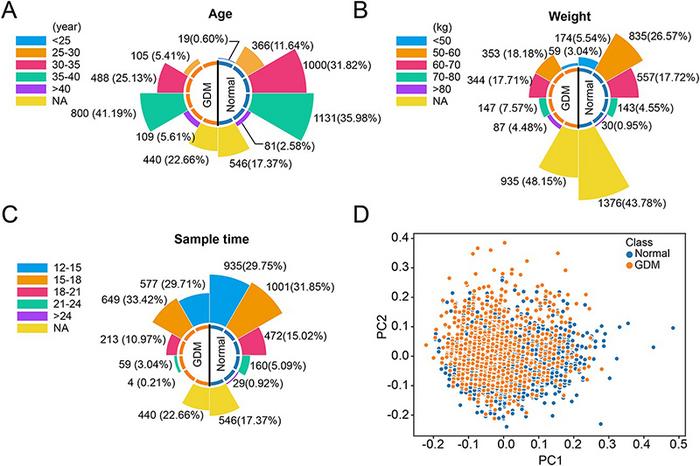Gestational diabetes mellitus (GDM) is a prevalent pregnancy complication posing significant health risks to both mothers and their newborns. Early detection and treatment of GDM are crucial to prevent adverse outcomes. Current screening methods, like glucose tolerance tests, are in after 24 weeks of pregnancy and have limitations in patient compliance and accuracy.

Credit: BGI Genomics
Gestational diabetes mellitus (GDM) is a prevalent pregnancy complication posing significant health risks to both mothers and their newborns. Early detection and treatment of GDM are crucial to prevent adverse outcomes. Current screening methods, like glucose tolerance tests, are in after 24 weeks of pregnancy and have limitations in patient compliance and accuracy.
A new study led by Lijian Zhao, Pei Sun, Hui Huang, Nan Li at BGI Genomics in collaboration with the Beijing Obstetrics and Gynecology Hospital, recently published on Briefings in Bioinformatics aimed to develop a non-invasive method for early detection of GDM using cell-free DNA (cfDNA) and deep learning models.
Methods and Findings:
A deep learning model was developed using circulating cell-free DNA samples from 5,085 pregnant women, including 1,942 GDM patients and 3,143 healthy controls, to predict GDM status.
The researchers built a Convolutional Neural Networks (CNN)-based deep neural network with a self-attention layer to analyze copy numbers of cfDNA sequencing data linked to gestational diabetes mellitus, focusing on identifying crucial genetic regions for accurate classification.
Key Points to Highlight:
1. The risk of gestational diabetes can be predicted non-invasively in the first trimester (12 weeks of pregnancy) which is earlier than the traditional method of glucose tolerance test performed late in pregnancy.
2. High accuracy of 93.5% in predicting GDM status, outperforming traditional methods.
3. Potential to improve patient compliance and accuracy in GDM screening, providing a promising approach for early detection of the gestational diabetes.
The study demonstrates the advantage of using cfDNA sequencing for early detection of GDM and highlights the importance of further investigating the use of deep learning models in precision medicine.
The analysis of cfDNA CNVs associated with diabetes genes and the use of a sophisticated model incorporating a self-attention layer to identify important genetic regions for accurate classification also allowed to identify:
•Essential genetic regions for accurate classification of GDM.
•CNV fragments covering 2190 genes, including known genes related to GDM like alpha- and beta-defensin genes (DEFA1, DEFA3, and DEFB1).
•Enriched biological processes and pathways linked to diabetes, such as glutamate signaling, forebrain development, and GTPase regulator activity.
Enhancing Research and Clinical Outcomes:
These findings provide a significant leap forward in understanding molecular mechanisms underlying GDM, offering insights for future research and therapeutic strategies.
About BGI Genomics:
BGI Genomics, headquartered in Shenzhen, China, is the world’s leading integrated solutions provider of precision medicine. Our services cover more than 100 countries and regions, involving more than 2,300 medical institutions. In July 2017, as a subsidiary of BGI Group, BGI Genomics (300676.SZ) was officially listed on the Shenzhen Stock Exchange.




